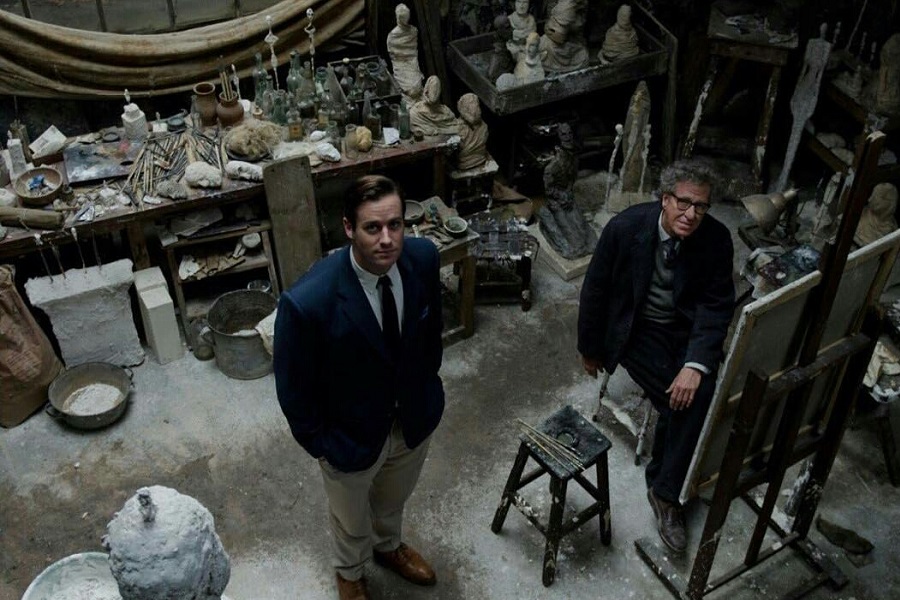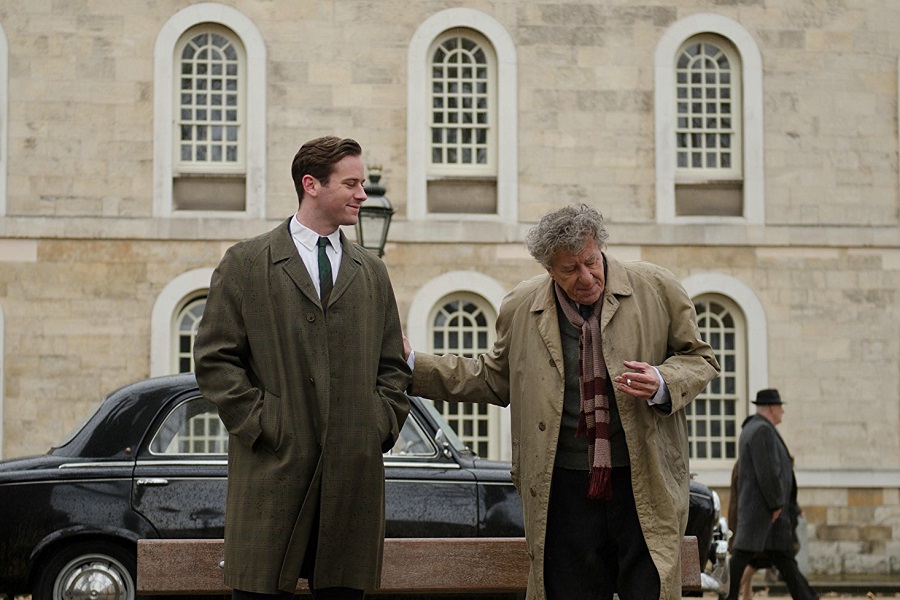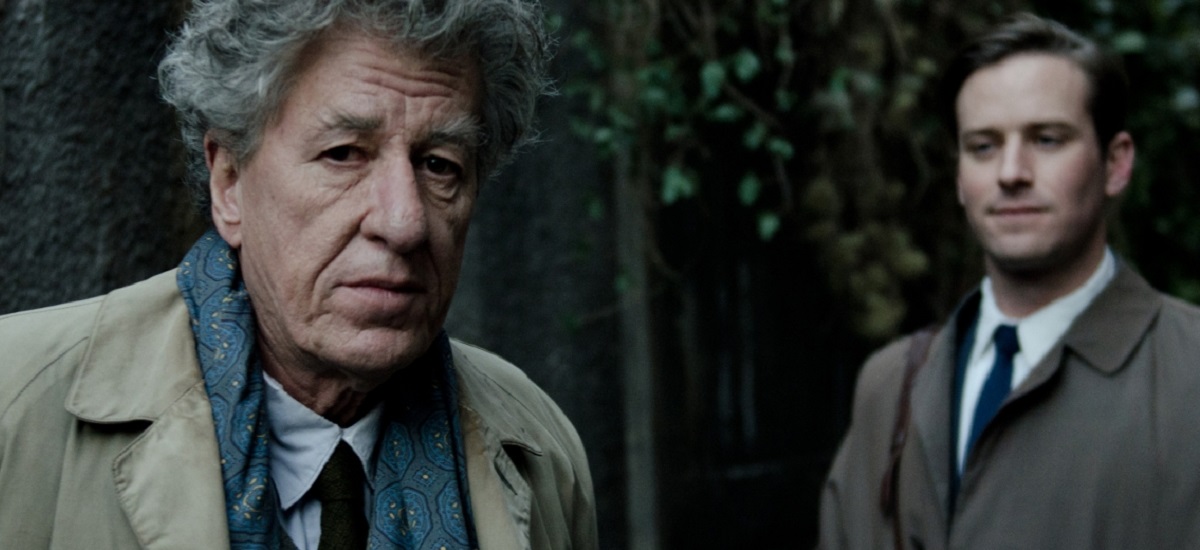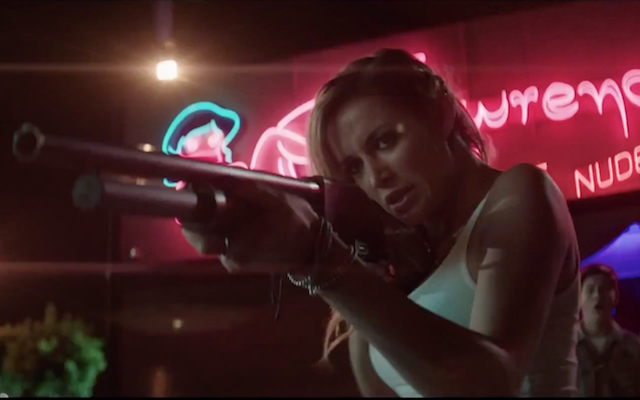When people talk about great actors turned directors, Stanley Tucci somehow gets buried in the mix. Maybe be it’s the fact that, of the five films he’s made, none of them try to draw attention to themselves. Almost a commendable quality, given the bright characters and subtle nuance he fits into every frame. In that way, his latest, Final Portrait, feels like a Tucci film, while also hitting upon big concepts like the creative process. It may be a small film, but that doesn’t make is any less enjoyable.
In 1964’s Paris, American novelist James Lord (Armie Hammer) paid a visit to his friend, artist and sculptor Alberto Giacometti (Geoffrey Rush). He excitedly made the trip after being offered the change to sit for a portrait. He’s told it will only take a few hours. A day at most. But then a creative block hits the painter and he asks his friend if he can make an extension. Just one more day. Then another. Days turn into weeks. Weeks what feel like years.

The little details and insights are what help make Final Portrait a joy to watch. As the days wear on, patterns begin to form through seemingly mundane routines, that in turn speak volumes of the characters. Tucci largely accomplishes this is silent passages. Giacometti’s studio looks like some recently ransacked laboratory. He himself shuffled through the space, tinkering at works in progress, before either destroying them, or preserving them for tomorrow’s routine.
In an almost virtuoso detour the two friends, on an afternoon stroll, stopp to get lunch. Upon entering a hole-in-the-wall bistro, a waiter instantly brings Giacometti a glass of port. Followed by 2 espresso. Followed by a small meal. Plates whizzing on and off the table, like clockwork. Never missing a beat Giacometti tries to explain his artistic process,. Then they leave and the waiter returns to his crossword puzzle.
A jaunty score undercuts some of the more somber moments, yet in a way that’s almost welcome. It’s manageable, given that the focus or thrust of the film is the friendship between Lord & Giacometti. They know each other well enough that Giacometti is willing to ask Lord to sit for a portrait. You can tell for Lord that it’s genuinely an honor to be asked. He’s also familiar with Giacometti’s brother (Shalhoub) and wife (Testud), which is understandable given how approachable they are compared to the semi-reclusive artist. At the same time, he’s more “second-cousin” than “true confidant”. As much as he’s allowed to peek behind the curtain, his questioning about the tolerating of certain antics, falls on deaf ears. Specially as it concerns current muse and bubbly prostitute Caroline (Clémence Poésy).

Tucci directs the hell out of Final Portrait. Even though it’s only marginally successful as a whole, you can tell that this feature has great importance to him. That’s evident by that he’s spent nearly 27 years trying to bring it to the screen. It had already been just over a decade since his last film, Blind Date, but all the markings of his previous works are still on display. There’s a joyful quality to all his pictures, regardless of subject. Here he tries for something slightly more and while each viewers mileage may vary, nails the right tone of introspection and observance.
The glue that holds everything together in a movie like this, are the performances. On that front Final Portrait fires on all cylinders. Rush and Hammer bounce off each other with relative ease. Testud is quietly commanding, equal parts devoted, cold and jaded, when asked. Shalhoub mostly hangs out in the background, but is such a loving presence, as to never distract. At times it feels almost like a hangout film, given the fly-on-the-wall camera work by Danny Cohen (The King’s Speech). The almost effortless quality though also allows the audience to settle in easily, soaking up every word, gesture and flourish.
The act of inspiration and creation is a fickle mistress. It can come and go for any number of reasons. Stanley Tucci mines this fertile ground in a film that could only be directed by someone who spent almost a lifetime trying to wrestle such a project into being. While not some big grand treatise on the nature of art, what’s on display is nonetheless captivating in it’s scant examination. It’s almost done in by a resolution that feels just as abrupt as it is incomplete. Giacometti himself actually states, several times in the film, that all works of art are in some stage of “unfinished”. By that regard Final Portrait is something of a minor triumph, the kind of smaller film that’s harder and harder to find these days.
*Final Portrait opens in limited release on March 23rd with plans to open wider throughout the next month. Check local theaters for opening and times.



